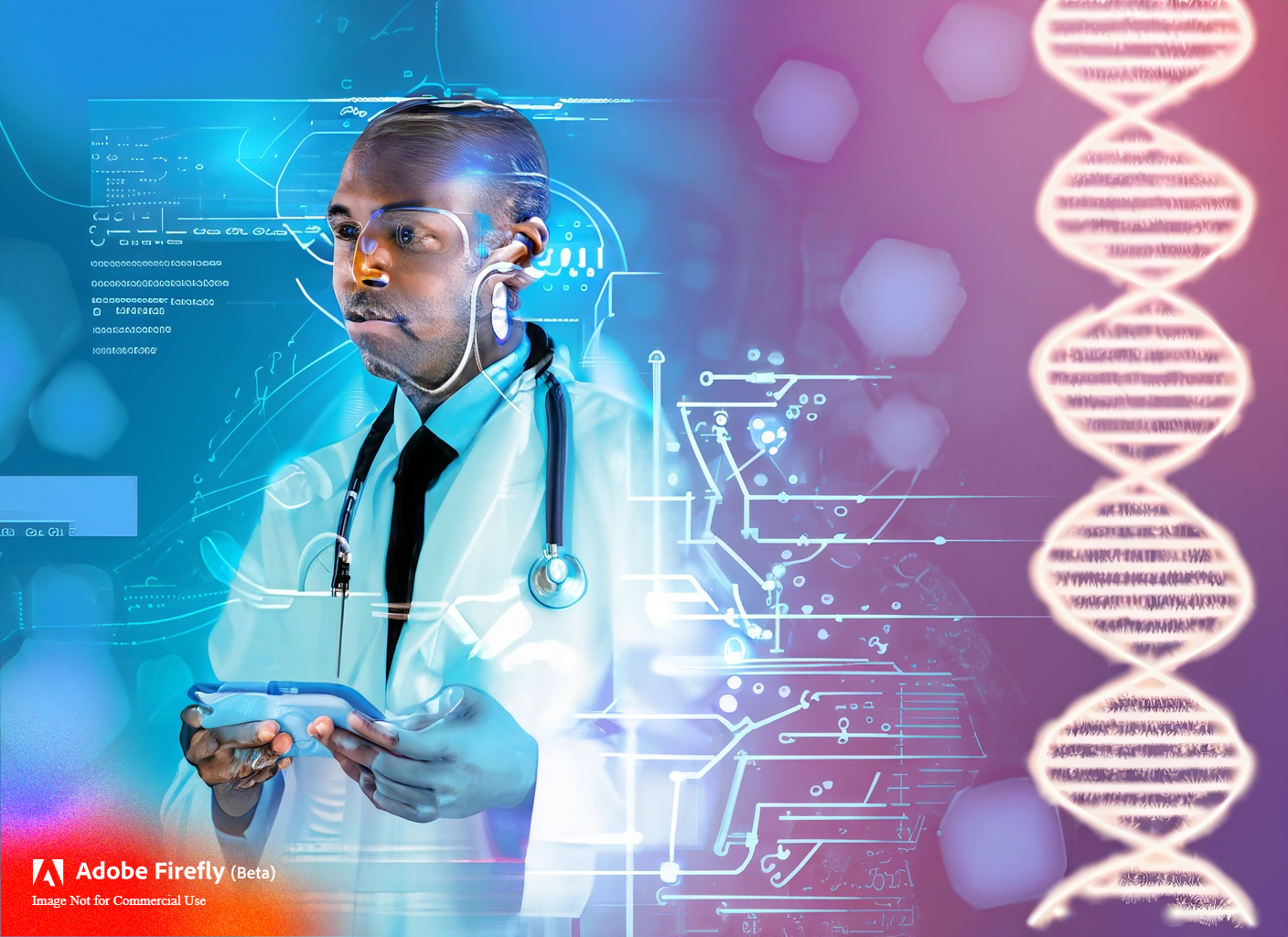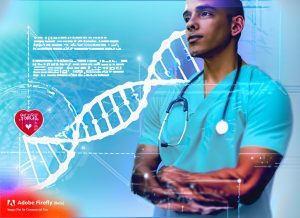
Synthetic Intelligence (AI) has emerged as a transformative expertise, revolutionizing varied industries and considerably impacting the healthcare sector. With its skill to course of huge quantities of knowledge, establish patterns, and make clever predictions, AI is being leveraged to enhance diagnostics, personalised drugs, and drug discovery. This text explores the unimaginable potential of AI in healthcare and the way it’s resulting in extra environment friendly and correct healthcare practices.
Desk of Contents
- Introduction: The Position of AI in Healthcare
- Enhancing Diagnostics with AI
- AI-Powered Imaging and Radiology
- AI-Pushed Diagnostic Instruments
- Customized Drugs and AI
- Precision Remedy and Predictive Analytics
- Genomic Sequencing and AI
- AI in Drug Discovery
- Accelerating Drug Growth Processes
- Digital Screening and AI Fashions
- Challenges and Moral Concerns
- Privateness and Safety Considerations
- Bias and Equity in AI Algorithms
- Conclusion
- FAQs (Incessantly Requested Questions)
1. Introduction: The Position of AI in Healthcare
The mixing of AI in healthcare is reworking the best way medical professionals diagnose ailments, ship personalised remedies, and uncover new medication. By leveraging machine studying algorithms and deep studying strategies, AI programs can analyze complicated medical information and supply helpful insights for healthcare suppliers. This results in improved affected person outcomes, diminished prices, and extra environment friendly healthcare practices.

2. Enhancing Diagnostics with AI
2.1 AI-Powered Imaging and Radiology
AI is revolutionizing medical imaging and radiology by enhancing diagnostic accuracy and effectivity. Deep studying algorithms can analyze medical pictures, equivalent to X-rays, CT scans, and MRIs, to detect anomalies and establish potential ailments. These AI-powered programs allow radiologists to interpret pictures extra precisely and effectively, resulting in earlier detection and improved affected person outcomes.
2.2 AI-Pushed Diagnostic Instruments
AI-powered diagnostic instruments are being developed to help healthcare professionals in diagnosing ailments and situations. By analyzing affected person signs, medical historical past, and laboratory outcomes, AI algorithms can present diagnostic suggestions and predictions. These instruments assist docs make knowledgeable selections, cut back diagnostic errors, and optimize remedy plans.
3. Customized Drugs and AI
3.1 Precision Remedy and Predictive Analytics
AI permits the follow of personalised drugs, tailoring remedies to particular person sufferers primarily based on their distinctive traits and medical historical past. By analyzing giant datasets and affected person data, AI algorithms can establish patterns and make predictions relating to remedy outcomes. This empowers healthcare suppliers to ship focused therapies, reduce antagonistic results, and optimize affected person care.
3.2 Genomic Sequencing and AI
Genomic sequencing generates huge quantities of genetic information, which might be difficult to interpret and make the most of successfully. AI algorithms can analyze genomic information to establish genetic variations related to ailments, predict illness dangers, and suggest personalised remedy choices. By integrating AI with genomics, healthcare professionals can ship exact, individualized care primarily based on a affected person’s genetic make-up.
4. AI in Drug Discovery
4.1 Accelerating Drug Growth Processes
The standard strategy of drug discovery is time-consuming and expensive. AI is revolutionizing this area by accelerating drug growth processes. Machine studying algorithms can analyze giant datasets, together with scientific literature, scientific trial information, and molecular buildings, to establish potential drug candidates. This expedites the identification of promising molecules, reduces the time to market, and lowers growth prices.
4.2 Digital Screening and AI Fashions
Digital screening, a way utilized in drug discovery, includes screening an unlimited variety of compounds to establish potential drug candidates. AI fashions can automate and improve this course of by predicting a molecule’s affinity for a selected goal and its potential unwanted side effects. By using AI-driven digital screening strategies, researchers can establish potential drug candidates extra effectively, bettering the success price of drug discovery efforts.
5. Challenges and Moral Concerns
Whereas AI gives great potential in healthcare, it additionally presents a number of challenges and moral concerns that should be addressed. Privateness and safety issues surrounding affected person information, algorithmic biases, and the necessity for transparency in AI decision-making are essential points. It’s essential to make sure that AI programs are sturdy, unbiased, and accountable to keep up affected person belief and uphold moral requirements in healthcare.
6. Conclusion
Synthetic Intelligence is reworking the healthcare business, empowering medical professionals to supply extra correct diagnostics, personalised remedies, and environment friendly drug discovery. By harnessing the facility of AI, healthcare practices have gotten extra exact, data-driven, and patient-centric. Nonetheless, it’s important to navigate the challenges related to AI adoption, equivalent to privateness, bias, and transparency, to make sure accountable and moral implementation.
FAQs (Incessantly Requested Questions)
How does AI enhance diagnostic accuracy in healthcare?
AI improves diagnostic accuracy in healthcare by leveraging superior algorithms and machine studying strategies to investigate huge quantities of medical information. By processing this information, AI programs can establish patterns, detect anomalies, and make predictions that help within the prognosis of ailments. This allows healthcare professionals to have entry to extra exact and dependable diagnostic info, resulting in improved accuracy in figuring out and treating varied medical situations.
Can AI personalize remedy plans for particular person sufferers?
Sure, AI can personalize remedy plans for particular person sufferers. By analyzing a affected person’s medical historical past, signs, genetic info, and different related information, AI algorithms can generate insights that assist healthcare professionals tailor remedy plans to fulfill particular affected person wants. AI can present predictions on remedy outcomes, suggest personalised therapies, and optimize remedy dosages, making certain that sufferers obtain individualized care that’s greatest suited to their distinctive circumstances.
What function does AI play in accelerating drug discovery processes?
AI performs a major function in accelerating drug discovery processes. Conventional drug discovery is a time-consuming and costly endeavor. Nonetheless, AI applied sciences can analyze huge quantities of scientific information, together with molecular buildings, genetic info, and scientific trial outcomes, to establish potential drug candidates extra effectively. AI-driven digital screening strategies may predict a molecule’s properties and display numerous compounds, expediting the method of figuring out promising drug candidates and in the end rushing up the drug growth timeline.
What moral concerns are related to AI in healthcare?
The mixing of AI in healthcare raises varied moral concerns. Privateness and safety of affected person information are paramount, as AI depends on entry to giant volumes of delicate info. Making certain affected person consent, information anonymization, and sturdy safety measures are important to guard affected person privateness. Moreover, algorithmic biases should be addressed to stop AI programs from perpetuating discriminatory practices. Transparency and accountability in AI decision-making are essential to sustaining belief and moral requirements in healthcare.
How can healthcare organizations handle algorithmic biases in AI programs?
Healthcare organizations can handle algorithmic biases in AI programs via a number of measures. Firstly, you will need to have numerous and consultant datasets for coaching AI fashions, as biased datasets can result in biased outcomes. Common auditing and testing of AI programs for bias detection and mitigation are essential to establish and handle any biases current. Transparency in AI algorithms, together with offering explanations for the system’s decision-making course of, will help establish and rectify biases. Lastly, involving multidisciplinary groups, together with ethicists and social scientists, within the growth and deployment of AI programs can present helpful insights and views to mitigate algorithmic biases and guarantee equity in healthcare AI purposes.
Get Entry Now: https://bit.ly/J_Umma
On this article, we’ve got explored the transformative function of AI in healthcare, from bettering diagnostics to personalised drugs and drug discovery. By leveraging AI applied sciences, healthcare practices have gotten extra environment friendly, correct, and patient-centric. As AI continues to advance, it’s essential to deal with the challenges and moral concerns to make sure accountable and efficient integration of AI in healthcare.





